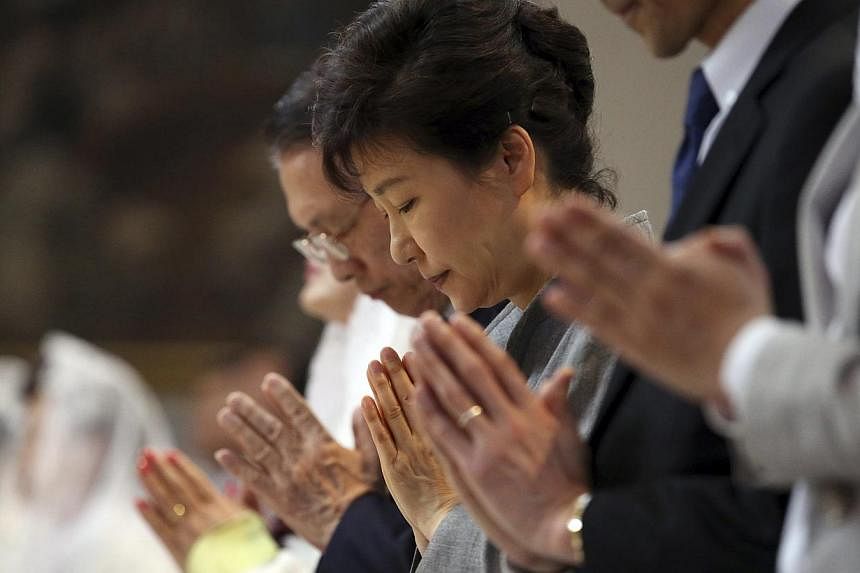SEOUL - South Korean President Park Geun Hye took tearful responsibility Monday for the mishandling of last month's Sewol ferry disaster, admitting that many lives were lost through incompetence and a lack of preparedness.
"The ultimate responsibility of the poor response to this accident lies with me," Park said in an address to the nation, during which she openly wept and twice bowed deeply before the television cameras in a display of contrition.
Park's popularity ratings have been hammered by the April 16 disaster that claimed around 300 lives, most of them schoolchildren.
She has voiced regret several times, but Monday's address was the first time she has explicitly accepted direct responsibility for what has become a defining moment of her presidency.
"As the president responsible for the lives and safety of South Koreans, I offer my sincere apology for all the suffering," she said.
Towards the end of her 30-minute address, Park's voice choked with emotion and tears ran down her cheeks as she described the heroic actions of some of the victims who died trying to save others.
Her comments highlighted the failure of the coastguard's immediate response to the tragedy, and acknowledged the complaints of the victims' relatives that many more lives might have been saved.
"I have decided to dismantle the coastguard," she said, adding that its investigative activities would be taken up by the police and its maritime patrol operations will be handed over to a newly created ministry of national safety.
The 6,825-tonne Sewol was carrying 476 people when it capsized and sank off the southern coast on April 16.
The confirmed death toll stood at 286 on Monday, with 18 still unaccounted for.
Of those on board, 325 were children from a high school on an organised trip to the southern resort island of Jeju.
The victims' families have been extremely critical of nearly every aspect of the government's handling of the disaster.
Many relatives believe some children may have survived for hours or even days inside air pockets in the capsized ferry, but died because rescuers took too long to access the submerged vessel.
Most of the ferry crew members escaped the vessel before it sank, and they have been vilified for abandoning hundreds of trapped passengers.
The Sewol's captain and three crew members were charged last week with manslaughter arising from gross negligence.
"The irresponsible acts of the captain and crew members who abandoned hundreds of people are practically an act of murder," Park said, adding that existing legislation would be amended to provide harsher penalties for officials found responsible for such accidents.
The Sewol tragedy has triggered a bout of intense national soul-searching in a country that had, until now, taken enormous pride in its extraordinarily rapid transformation from a war-torn, impoverished backwater to Asia's fourth-largest economy
Investigations into the disaster have suggested it was almost wholly man-made: the result of cut corners, regulatory violations, poor safety training and a woeful lack of oversight - all, or nearly all, attributable to a desire to maximise profits.
"It is our duty to reform and transform the country so that these lives were not lost for nothing," Park said, pledging to address the corrupt culture of collusion between regulators and business.
"Now is the time to leave frustration behind and move forward. We have to set the country upright and transform it.
"I will stake my political life on correcting the wrong practices that have plagued our country for so long and to create a new republic of Korea," she said.

